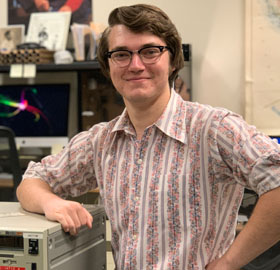
First Place Winner

Tyler Ortel
Audio Visual Technician, Brown Media Archives, UGA Libraries
Major: Entertainment and Media Studies, Grady College of Journalism
Hometown: Watkinsville, Georgia
Tyler has worked in the Walter J. Brown Media Archives since Summer 2018, and over the past two years he has brought enthusiasm, knowledge, and expert-level technical skills to the department. Tyler was hired as a student audiovisual technician to assist with digitizing our collections. The Brown Media Archive is the third largest audiovisual archive in the United States, and it holds tens of thousands of archival recordings on dozens of obsolete and decaying formats.
Tyler has made significant contributions not only to our department but to the larger historical record. Last year, Tyler's work helped us to identify Ed Dwight, a man who was poised to become the first black astronaut until JFK's assassination when he was pushed out of the program, in a clip from the WSB Newsfilm Collection (http://dlg.galileo.usg.edu/news/id:wsbn34871). The archival footage in our collections often comes to us with absent or incomplete descriptions. In this case, we had a news clip from 1963 that had been labeled "first black astronaut" in WSB's records. The man depicted in the film did not appear to be Guy Bluford, who is credited as the first black astronaut, but we did not know who he actually was. After being contacted by a researcher from the New York Times who was working on a story about Dwight, Tyler created a new digital scan of the original archival film, and we were able to positively determine that the man in the film was Ed Dwight. Tyler's work helped us identify this unique, historically significant footage (very few moving images of Dwight during his astronaut training are known to exist) and the digital video he made from the film scan was featured prominently in a New York Times feature on Dwight (https://nyti.ms/2S3d3D1). Without Tyler's work, Dwight might still be languishing in our records as "unidentified male."
This is not the only example of Tyler's work helping bring unique, historic footage to light. Sometimes, this happens by coincidence. Tyler completed digital transfers of many films from wildlife expert and television host Jim Fowler's collection in our archive just weeks before Fowler passed away in 2019. We were happy to be able to share the films Tyler digitized with Fowler's family. Other times, we have directly sought Tyler's expertise to help restore footage that even professional digitization vendors were not able to complete. An example of this is Tyler's work with U-matic videotapes from the WSB Video Collection. We have been working with documentary filmmakers at HBO to supply footage from our collections for a docuseries on the Atlanta Child Murders. The original news footage in our collections from the time period of the Atlanta child murders was recorded on ¾" U-matic tape, a notoriously problematic type of magnetic video tape. The tapes had previously been digitized by a professional vendor before we took custody of the collection, but there were portions of the tape that were not viewable due to bad transfers (which is not uncommon for U-matic tapes). Because of our confidence in Tyler's skills as a "videotape whisperer," we trusted him to attempt new transfers of the original tapes. Tyler was able to successfully recover previously lost footage showing the news coverage from the very earliest days of the missing and murdered children, footage that the archival researcher described as invaluable in their quest to uncover primary sources related to the crimes.
Tyler's skills in inspecting and repairing our audio players and video decks has potentially saved us thousands of dollars in repairs and maintenance that would otherwise need to be outsourced (an expensive and cumbersome task, as it involves transporting large playback devices that can weigh upwards of 70 pounds to a service provider in Atlanta). A few months ago, we had a problem with our film scanner, a very specialized and expensive piece of equipment that was purchased from Germany. Tyler was able to diagnose the problem by locating a small wire that had been worn through from contact with the film as it moved through the scanner. Instead of having to replace our broken sound head with a new one ($10,000), we were able to call in a local technician who said that he would be able to perform the repair with a piece of electronic wiring that cost less than $5.
Congratulations Tyler, you have accomplished so much for others while at UGA.
Nominated by: Callie Holmes, Digital Archivist and Digitization Unit Head, Brown Media Archive, UGA Libraries